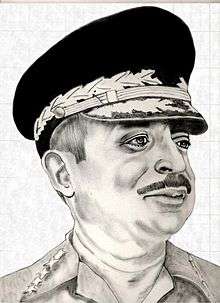Policarpo Paz García
| Policarpo Paz García | |
|---|---|
 Sketch of Policarpo Paz García | |
| 46th President of Honduras | |
|
In office 7 August 1978 – 27 January 1982 | |
| Preceded by |
Juan Alberto Melgar Castro (Head of State) |
| Succeeded by | Roberto Suazo Córdova |
| Military of Honduras | |
|
In office 7 August 1978 – 27 January 1980 | |
| Preceded by | Juan Alberto Melgar Castro |
| Succeeded by | Gustavo Álvarez Martínez |
| Personal details | |
| Born |
Policarpo Juan Paz García 7 December 1932 Goascorán, Honduras |
| Died |
16 April 2000 (aged 67) Tegucigalpa, Honduras |
| Nationality | Honduran |
| Political party | Military |
| Spouse(s) | Carlota Márquez de Paz García |
| Alma mater | Escuela Militar de Honduras |
| Profession | Physician, Politician |
| Religion | Roman Catholic |
Policarpo Juan Paz García (7 December 1932 – 16 April 2000) was a Honduran military leader and autocrat who served as President of Honduras from 7 August 1978 until 27 January 1982.
Biography
Paz was born in 1932 in La Arada, Goascoran, Valle, Honduras.
Paz took power in 1978 in a "cocaine coup" financed by the Medellín Cartel-linked drug lord Juan Matta-Ballesteros.[1] The CIA took "a close and friendly interest" in the coup as Paz, unlike his predecessor Juan Alberto Melgar Castro, was a keen supporter of Nicaragua's Anastasio Somoza Debayle - actually the United States had cut off support for Somoza by 1978.[1] Under Paz, the Honduran army and intelligence service received a cut of Matta-Ballesteros' profits in return for protection, as Honduras became a major shipment route for cocaine and marijuana from Colombia.[1] When the US Drug Enforcement Administration set up its first office in Tegucigalpa in 1981, its resident agent "rapidly came to the accurate conclusion that the entire Honduran government was deeply involved in the drug trade."[2]
His tenure is also noted for corruption, and the high level of military repression, including the startling leap of activity attributable to Battalion 316, a secret right-wing paramilitary death squad trained by the CIA. The services of Batalión 3-16 were called upon during the Reagan administration and the American military activity in Central America to support the Contras.
The military had ruled Honduras almost continuously since 1963, and Paz was the last of the generals to rule the country. The Honduran general election, 1981 saw Roberto Suazo elected President, and Paz handed over power in January 1982.
Since then he lived devoted to his private work in the capital city of Tegucigalpa until his death, which occurred in that city at age 67 on 16 April 2000 due to kidney failure.
See also
References
- 1 2 3 Alexander Cockburn and Jeffrey St. Clair (1998), Whiteout: The CIA, Drugs and the Press. ISBN 1-85984-258-5. p281
- ↑ Alexander Cockburn and Jeffrey St. Clair (1998), Whiteout: The CIA, Drugs and the Press. ISBN 1-85984-258-5. p283
| Political offices | ||
|---|---|---|
| Preceded by Juan Alberto Melgar Head of State |
President of Honduras 1978–1982 |
Succeeded by Roberto Suazo |
| ||||||||||||